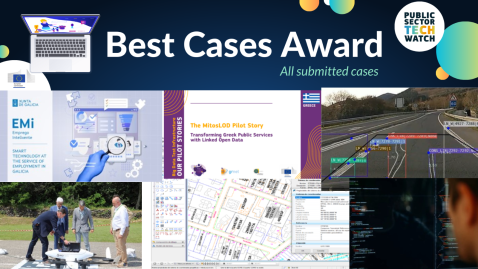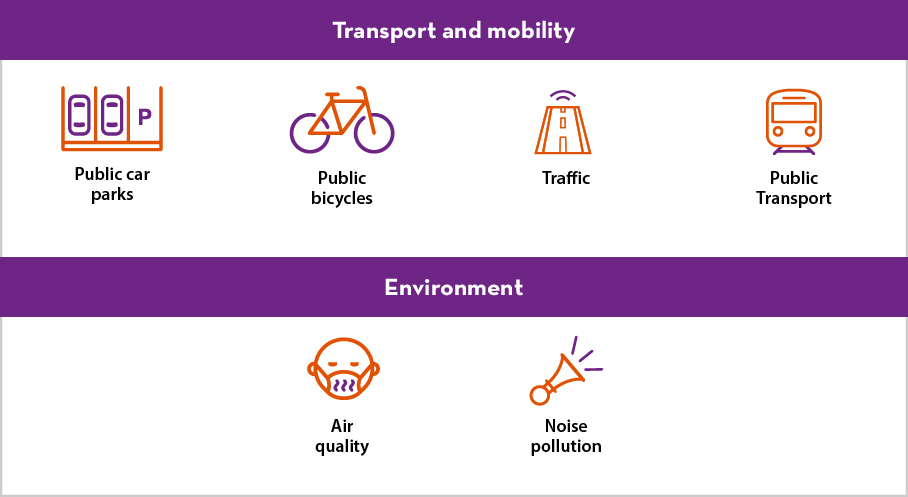Eight Spanish solutions among the finalists of the European Best Cases Award 2024.
Fecha de la noticia: 11-11-2024

The 2024 Best Cases Awards of the Public Sector Tech Watch observatory now have finalists. These awards seek to highlight solutions that use emerging technologies, such as artificial intelligence or blockchain, in public administrations, through two categories:
- Solutions to improve the public services offered to citizens (Government-to-Citizen or G2C).
- Solutions to improve the internal processes of the administrations themselves (Government-to-Government or G2G).
The awards are intended to create a mechanism for sharing the best experiences on the use of emerging technologies in the public sector and thus give visibility to the most innovative administrations in Europe.
Almost 60% of the finalist solutions are Spanish.
In total, 32 proposals have been received, 14 of which have been pre-selected in a preliminary evaluation. Of these, more than half are solutions from Spanish organisations. Specifically, nine finalists have been shortlisted for the G2G category -five of them Spanish- and five for G2C -three of them linked to our country-.The following is a summary of what these Spanish solutions consist of.
Solutions to improve the internal processes of the administrations themselves.
- Innovation in local government: digital transformation and GeoAI for data management (Alicante Provincial Council).
Suma Gestión Tributaria, of the Diputación de Alicante, is the agency in charge of managing and collecting the municipal taxes of the city councils of its province. To optimise this task, they have developed a solution that combines geographic information systems and artificial intelligence (machine learning and deep learning) to improve training in detection of properties that do not pay taxes. This solution collects data from multiple administrations and entities in order to avoid delays in the collection of municipalities.
- Regional inspector of public infrastructures: monitoring of construction sites (Provincial Council of Bizkaia and Interbiak).
The autonomous road inspector and autonomous urban inspector help public administrations to automatically monitor roads. These solutions, which can be installed in any vehicle, use artificial or computer vision techniques along with information from sensors to automatically check the condition of traffic signs, road markings, protective barriers, etc. They also perform early forecasting of pavement degradation, monitor construction sites and generate alerts for hazards such as possible landslides.
- Application of drones for the transport of biological samples (Centre for Telecommunications and Information Technologies -CTTI-, Generalitat de Catalunya).
This pilot project implements and evaluates a health transport route in the Girona health region. Its aim is to transport biological samples (blood and urine) between a primary health centre and a hospital using drones. As a result, the journey time has been reduced from 20 minutes with ground transport to seven minutes with the use of drones. This has improved the quality of the samples transported, increased flexibility in scheduling transport times and reduced environmental impact.
- Robotic automation of processes in the administration of justice (Ministry of the Presidency, Justice and Relations with the Courts).
Ministry of the Presidency, Justice and Relations with the Courts has implemented a solution for the robotisation of administrative processes in order to streamline routine, repetitive and low-risk work. To date, more than 25 process automation lines have been implemented, including the automatic cancellation of criminal records, nationality applications, automatic issuance of life insurance certificates, etc. As a result, it is estimated that more than 500,000 working hourshave been saved.
- Artificial intelligence in the processing of official publications (Official Gazette of the Province of Barcelona and Official Documentation and Publications Service, Barcelona Provincial Council).
CIDO (Official Information and Documentation Search Engine) has implemented an AI system that automatically generates summaries of official publications of the public administrations of Barcelona. Using supervised machine learning and neural networkstechniques, the system generates summaries of up to 100 words for publications in Catalan or Spanish. The tool allows the recording of manual modifications to improve accuracy.
Solutions to improve the public services offered to citizens
- Virtual Desk of Digital Immediacy: bringing Justice closer to citizens through digitalisation (Ministry of the Presidency, Justice and Relations with the Courts).
The Virtual Digital Immediacy Desktop (EVID) allows remote hearings with full guarantees of legal certainty using blockchain technologies. The solution integrates the convening of the hearing, the provision of documentation, the identification of the participants, the acceptance of consents, the generation of the document justifying the action carried out, the signing of the document and the recording of the session. In this way, legal acts can be carried out from anywhere, without the need to travel and in a simple way, making justice more inclusive, accessible and environmentally friendly. By the end of June 2024, more than 370,000 virtual sessions had been held through EVID.
- Application of Generative AI to make it easier for citizens to understand legal texts (Entitat Autònoma del Diari Oficial i Publicacions -EADOP-, Generalitat de Catalunya).
Legal language is often a barrier that prevents citizens from easily understanding legal texts. To remove this obstacle, the Government is making available to users of the Legal Portal of Catalonia and to the general public the summaries of Catalan law in simple language obtained from generative artificial intelligence. The aim is to have summaries of the more than 14,000 14,000 existing regulatory provisions adapted to clear communication available by the end of the year. The abstracts will be published in Catalan and Spanish, with the prospect of also offering a version in Aranesein the future.
- Emi - Intelligent Employment (Consellería de Emprego, Comercio e Emigración de la Xunta de Galicia).
Emi, Intelligent Employment is an artificial intelligence and big data tool that helps the offices of the Public Employment Service of Galicia to orient unemployed people towards the skills required by the labour market, according to their abilities. AI models make six-month projections of contracts for a particular occupation for a chosen geographical area. In addition, they allow estimating the probability of finding employment for individuals in the coming months.
You can see all the solutions presented here. The winners will be announced at the final event on 28 November. The ceremony takes place in Brussels, but can also be followed online. To do so, you need to register here.
Public Sector Tech Watch: an observatory to inspire new projects
Public Sector Tech Watch (PSTW), managed by the European Commission, is positioned as a "one-stop shop" for all those interested - public sector, policy makers, private companies, academia, etc. - in the latest technological developments to improve public sector performance and service delivery. For this purpose, it has several sections where the following information of interest is displayed:
- Cases: contains examples of how innovative technologies and their associated data are used by public sector organisations in Europe.
- Stories: presents testimonials to show the challenges faced by European administrations in implementing technological solutions.
If you know of a case of interest that is not currently monitored by PSTW, you can register it here. Successful cases are reviewed and evaluated before being included in the database.














